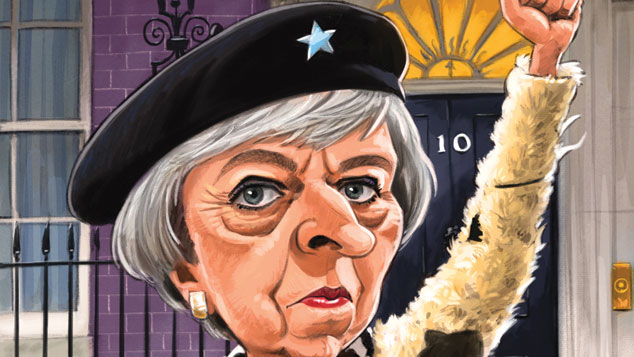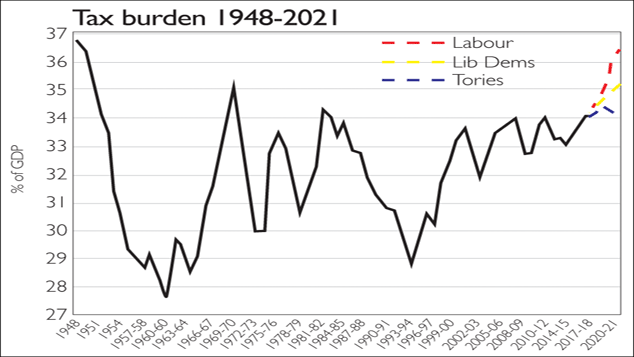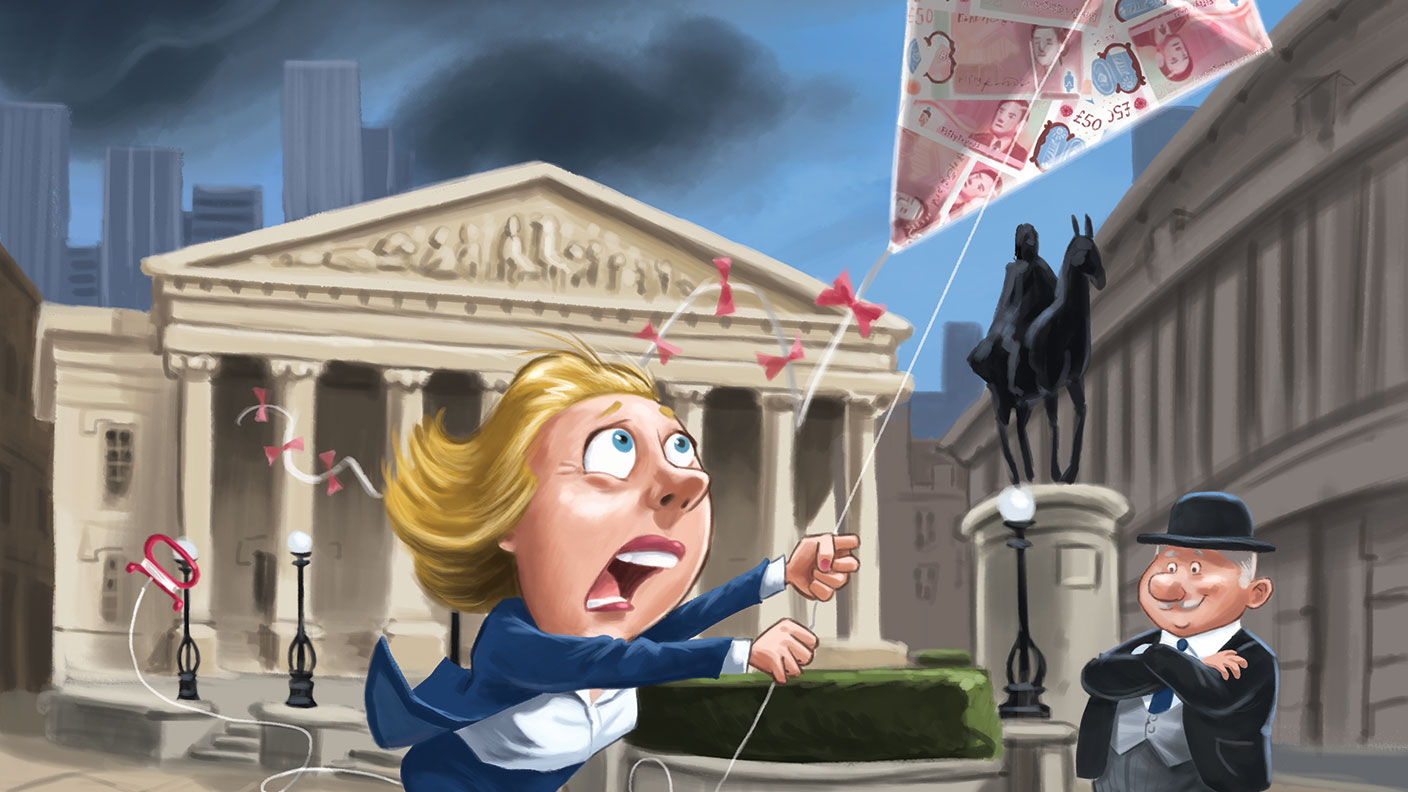Does anyone know what Mayism means?
The PM has been called a “Red Tory” for saying she will step in when the state isn’t working, but it’s her silence on the UK’s huge debt that is really worrying, says Merryn Somerset Webb.

Get the latest financial news, insights and expert analysis from our award-winning MoneyWeek team, to help you understand what really matters when it comes to your finances.
You are now subscribed
Your newsletter sign-up was successful
Want to add more newsletters?

Twice daily
MoneyWeek
Get the latest financial news, insights and expert analysis from our award-winning MoneyWeek team, to help you understand what really matters when it comes to your finances.

Four times a week
Look After My Bills
Sign up to our free money-saving newsletter, filled with the latest news and expert advice to help you find the best tips and deals for managing your bills. Start saving today!

The PM has been called a "Red Tory" for saying she will step in when the state isn't working, but it's her silence on the UK's huge debt that is really worrying, says Merryn Somerset Webb.
Is it worth considering the contents of the main parties' manifestos? After all, the prime minister, Theresa May, still has a commanding 13-point lead in the polls, and there is a near-universal acceptance that Labour leader Jeremy Corbyn would be a hopeless PM.
He is, as The Daily Telegraph says, "inexperienced, far left" and stuck with an odd history of supporting extremist causes. If this election is about leadership (as everyone says it is), he is surely a guaranteed loser. Moreover, his manifesto is more a teenage hopes and dreams wish list than a plan. It seems unlikely voters will fall for it.But May hasn't covered herself in leadership glory this week either. The chaos over care costs (see below) reflected a communications disaster. May failed to explain that her policy was both very progressive, and a bit of a giveaway to those with low-ish levels of housing equity. Then when she capitulated (all too rapidly), she did so in a foolishly vague way.
MoneyWeek
Subscribe to MoneyWeek today and get your first six magazine issues absolutely FREE

Sign up to Money Morning
Don't miss the latest investment and personal finances news, market analysis, plus money-saving tips with our free twice-daily newsletter
Don't miss the latest investment and personal finances news, market analysis, plus money-saving tips with our free twice-daily newsletter
Worse still, the whole thing reminded us all about her other changes of mind (on national insurance rises for the self-employed, on workers on boards, and on having an election) and hence made her manifesto seem rather more temporary than it should be. The result? Last week, as Janan Ganesh notes in the Financial Times, we all wanted to know who May really is this week we just want to know if she is "any good".
Also, both manifestos are, as the BBC's Andrew Neil described May's, "half baked and uncosted". Both Labour and Conservative seem utterly unbothered by the UK's vast debt. Maybe that's OK. Last week, the UK issued £5bn-worth of 40-year debt at 1.7%: clearly the bond market which will buy a net £35bn in gilts this year isn't much bothered by the endless pushing out of the day when the UK finally stops spending more than it raises in taxes each year (May's target is now 2025). That makes some sense: as Scott Thiel of Blackrock told the FT, the UK political system is "very stable... I'd be very hard pressed to find a client or investor who would suggest that, unlike the Italian or Irish bonds, the UK had any kind of risk in it at all."
But that doesn't put the UK in the clear. We still have the (never-mentioned) problem of the £453bn the government lent to itself via quantitative easing. We still have total debt just shy of 90% of GDP (the highest since the 1960s, and up from 55% in 2007); we spend more on debt interest (8% of tax revenues) than we do on schools; and 30% of our debt is held by foreign investors, who, one day, might ask for more than 1.7%. What makes anyone think that the expensive promises made by modern politicians have any hope at all of seeing the light of day?
Still, the manifestos and May's in particular are useful for at least one thing: they tell us a huge amount about the direction of travel of UK politics. It is OK with debt. It is wary of markets and business. And most importantly of all, it is statist. Very. Corbyn wants to see a relentless round of "tax and spend", coupled with the renationalisation of everything from the railways (see page 32) to Royal Mail. The Lib Dems are mad to tax and spend as well. And May's own manifesto is full of plans for state intervention.
She is against "untrammelled markets" and too much in the way of individualism. She is prepared to step in wherever she perceives the market as not working (which is all over the place). She is, say most commentators, a "Red Tory". Is that fair? It has grains of truth in it her utility bill cap might work differently to former Labour leader Ed Miliband's, but it still comes from his song sheet.
However there is something a little different going on here. While May is as keen on raising more tax revenue as the rest (tax is mentioned 30 times in the manifesto), an awful lot of what she is doing is not promising more state spending, but instead promising to find ways to transfer wealth without making the state the "middle man". That's what raising the minimum wage is about it cuts the tax credit bill without cutting incomes.
The same theme runs through plans to regulate the gig economy, to have worker representatives on boards, and for pension trustees to be able to stall mergers and acquisitions. It is also there in the apprenticeship levy (one-time state costs become corporate costs), in her plan to "strengthen the hand" of regulators, and in the way the social care plan used the state to manage the financing but not to finance costs. It is intervention to have a go at dealing with "burning injustices" but without a chequebook. So Mayism is (I think!) about a more intrusive state, but not necessarily a bigger one.
We've been warning that this has been coming for a long time that if big companies don't raise their game on wages (up for workers, down for management) and on recognising the long term and social impacts of their behaviour, someone else will do it for them. If you assume that this manifesto is no more than a hint to the future (no one running for their first proper go as PM puts their most radical ideas in their first portfolio), it looks like that someone might be May. Below I run through some of the points in the main portfolios it is far from comprehensive, but it does focus on the ideas most likely to affect us all most over the next few years.
Tax
It doesn't matter who wins, one way or another, taxes are going up. No party has so much as hinted at a desire to reduce the overall tax burden. This is not a good thing, given that the state is almost always worse at distributing cash than those who earned it in the first place. So who is after what? Corbyn has made it clear that while you aren't rich if you have £100,000 of assets (he was against May's care policy) you are rich if you earn over £80,000 a year (go figure). That means that your personal income tax rate should go up to 45% and then to 50% (over £123,000). Earn £150,000, end up with Corbyn as your PM, and you'll pay £5,425 more in tax each year. He is definitely after your income.
May, on the other hand, could be after your assets. "Working families" aren't her target, she says: the personal allowance and the higher-rate tax threshold will keep rising, saving the top 10% of income earners around £165 a year, says the Resolution Foundation. The headline rate of corporation tax isn't her target either (Corbyn would put it up to 26%, May is sticking with the path to 17%). But we saw from social care policy that your house could be. She clearly does not consider as her predecessor David Cameron appeared to a family home to be a deity of some kind.
For her it is just an asset one she'd quite like to capture some value from. How? There could be changes to inheritance tax (IHT goodbye to the family home allowance?) or in capital gains tax (CGT) on primary homes, perhaps. We might also see some other types of wealth tax how about a shift in the bizarrely generous treatment of defined-contribution pensions on death (you pay no IHT at all on them)?
Or perhaps the mother of all wealth taxes a land value tax. George Bull at RSM points to the section of the manifesto where it says, "we will work with private and public sector house builders to capture the increase in land value created when they build". That could mean just taxing the uplift in value enjoyed by landowners when they sell sites for development. Or it could mean taxing existing property occupiers whose properties gain value because of improvements in local infrastructure. But either way, it's a land tax (and a new tax to boot).

Pensioners
May is well aware of the intergenerational inequalities and tensions in the UK. She clearly wants to start on dealing with them. So out goes the £300 fuel allowance for the well-off (it is to be means-tested and offered only to those in genuine fuel poverty). Out goes the triple lock: state pensions will now rise by the greater of wage growth or inflation, with the 2.5% third leg removed. Given that inflation will likely be rather higher than 2.5% for a while this is probably financially meaningless. But it's a good direction signifier nonetheless.
There is also a new (if vague) idea of linking the state retirement age to life expectancy. Again this is unlikely to mean anything life expectancy in the UK isn't rising anymore (for now). But again, it gives us direction. Where we have none, however, is on private pensions: there is no mention of reforms to relief. This is irritating. May is surely sensible enough to see that both the lifetime allowance and the absurd tapering rules must go and she's surely desperate enough for cash to know she probably has to have a go at higher rate relief.
Business
No one is speaking for business in this election. So much so that the chapter in May's manifesto fails to mention our greatest success, the financial services industry. May has plans for executive pay (binding annual votes); for regulation of the gig economy; to examine the reasons for share buybacks (they are mostly bad we'll enjoy this one); to bump up workers' rights (even the Trade Unions Congress calls this "promising"); to restrain foreign takeovers; to raise the cost of employing foreign workers (the immigration skills charge is to rise to £2,000 a year); to give pension trustees more power over sponsor companies (possibly even to block merger deals that might threaten their schemes); and to introduce a new industrial policy.
Not all of this is popular with business owners. "It's easy to invent a policy where I pay for it," complained one business owner in The Daily Telegraph. He's right. It is. That's why she is doing it. Also of note here is immigration policy and May's plan to stick to her (so far useless) plan to bring it down to a net 100,000. This could mean a tough transition period for firms that are used to endless supplies of state-subsidised cheap labour. But it might also mean they raise their game on capital investment and productivity over the next decade. Lose followed by win?
Brexit
Both manifestos assume that we leave the single market. Both parties want a close relationship with the European Union. May wants "fair and orderly negotiations, minimising disruption and giving as much certainty as possible so both sides benefit", alongside a "fair settlement of the UK's rights and obligtions" on withdrawal. Who doesn't? None of this tells us anything we didn't assume already which is really the only reason for mentioning it.
Housing
Everyone, predicatably, is pro-houses lots of them. Labour will cap rents and introduce three-year tenancies, but also build 100,000 "genuinely affordable" homes by the end of the next parliament. The Tories says they will give us 1.5 million new houses over the next seven years. No housing promises from any governments are ever met.
NHS
There are a few truths it is worth remembering every time a politician in the UK opens his or her mouth. One of the most important is that the NHS will never have enough money. Never. Now is not an exception: in the last financial year, NHS hospitals and ambulance trusts recorded a deficit of around £700m; 100 of 235 are in the red. That's £120m more than we were told would be the maximum acceptable last year, and only less than the £2.4bn the year before thanks to a £1.8bn injection of cash earlier this year. Labour is offering to deal with this with an extra £30bn over the next parliament. The Tories have offered real-terms spending increases over the next five years. Neither will be enough.
What you'll pay for social care
At the moment, if you need some form of care, your local council will assess you. It will start to contribute to your costs if you have assets of less than £23,250, and it will pay all of them once your assets fall below £14,250. If you need care at home, then your house does not count towards your assets for the purposes of this assessment. If you need residential care, it usually does although it won't be taken into account if it is lived in by a partner, a relative aged over 60 or under 18, or by a disabled relative.
There is no cap on the costs any individual must bear David Cameron's government had planned to bring in one at £72,000 in order to preserve the inheritances the better off are able to leave, and to help the City to create a more widely used insurance market (think about this in terms of house insurance a premium can only be worked out if the maximum value of replacing your possessions, or rebuilding your house, is knowable).
May's plan had been to raise the floor to £100,000 (good for everyone); to include houses in the calculation for home-based care (bad for homeowners staying at home); and to skip introducing the cap (bad for those who have a lot of money and need long-term care). She has now reneged on the latter, which suggests she will either have to set the cap very high, or move her floor down if she wants to claw much cash back.
Nurses and foodbanks the real story
When I was on the BBC's Question Time a few weeks ago there was a nurse in the front row. She wasn't happy with her pay. She turned up again at the Scottish leaders' debate. There she claimed that, even as a full-time worker, she sometimes has to use food banks. That nurses are regulars at food banksis now an established political fact.But is this really true?
The minimum a nurse can be paid is £22,000, not including overtime and extra pay for unsocial hours. The NHS puts average nursing pay at £31,000. That is a fall in real terms (after inflation) since 2010, but still higher than the UK average wage (£28,000), and again, it doesn't include unsocial hours or overtime. As for the numbers using food banks food bank provider Trussell Trust tells the BBC's More or Less programme that there have been "occasional cases" of nurses (mostly students) coming to them as a result of unexpected circumstances such as family breakdown. But that's it.
The Royal College of Nursing meanwhile says that 700 nurses (out of 315,000) applied for hardship grants in 2016. If we assume that those are also the ones that need help from food banks, it comes to 0.2% of the total. How does that compare to the wider population? The Trussell Trust, which operates about half of the UK's food banks, reckons it has around 500,000 unique visitors a year. So say a million UK residents a year use a food bank. That's 1.5%, which makes the number for nurses look pretty low.
Get the latest financial news, insights and expert analysis from our award-winning MoneyWeek team, to help you understand what really matters when it comes to your finances.

-
 New PM Sanae Takaichi has a mandate and a plan to boost Japan's economy
New PM Sanae Takaichi has a mandate and a plan to boost Japan's economyOpinion Markets applauded new prime minister Sanae Takaichi’s victory – and Japan's economy and stockmarket have further to climb, says Merryn Somerset Webb
-
 Plan 2 student loans: a tax on aspiration?
Plan 2 student loans: a tax on aspiration?The Plan 2 student loan system is not only unfair, but introduces perverse incentives that act as a brake on growth and productivity. Change is overdue, says Simon Wilson
-
 Governments will sink in a world drowning in debt
Governments will sink in a world drowning in debtCover Story Rising interest rates and soaring inflation will leave many governments with unsustainable debts. Get set for a wave of sovereign defaults, says Jonathan Compton.
-
 Why Australia’s luck is set to run out
Why Australia’s luck is set to run outCover Story A low-quality election campaign in Australia has produced a government with no clear strategy. That’s bad news in an increasingly difficult geopolitical environment, says Philip Pilkington
-
 Why new technology is the future of the construction industry
Why new technology is the future of the construction industryCover Story The construction industry faces many challenges. New technologies from augmented reality and digitisation to exoskeletons and robotics can help solve them. Matthew Partridge reports.
-
 UBI which was once unthinkable is being rolled out around the world. What's going on?
UBI which was once unthinkable is being rolled out around the world. What's going on?Cover Story Universal basic income, the idea that everyone should be paid a liveable income by the state, no strings attached, was once for the birds. Now it seems it’s on the brink of being rolled out, says Stuart Watkins.
-
 Inflation is here to stay: it’s time to protect your portfolio
Inflation is here to stay: it’s time to protect your portfolioCover Story Unlike in 2008, widespread money printing and government spending are pushing up prices. Central banks can’t raise interest rates because the world can’t afford it, says John Stepek. Here’s what happens next
-
 Will Biden’s stimulus package fuel global inflation – and how can you protect your wealth?
Will Biden’s stimulus package fuel global inflation – and how can you protect your wealth?Cover Story Joe Biden’s latest stimulus package threatens to fuel inflation around the globe. What should investors do?
-
 What the race for the White House means for your money
What the race for the White House means for your moneyCover Story American voters are about to decide whether Donald Trump or Joe Biden will take the oath of office on 20 January. Matthew Partridge explains how various election scenarios could affect your portfolio.
-
 What’s worse: monopoly power or government intervention?
What’s worse: monopoly power or government intervention?Cover Story Politicians of all stripes increasingly agree with Karl Marx on one point – that monopolies are an inevitable consequence of free-market capitalism, and must be broken up. Are they right? Stuart Watkins isn’t so sure.